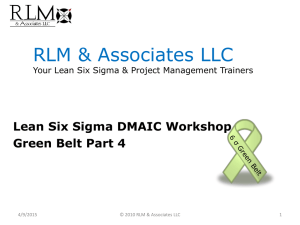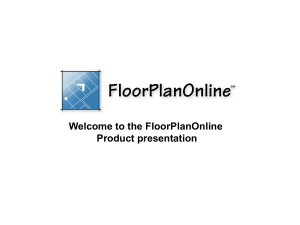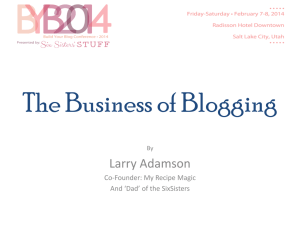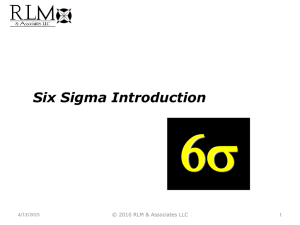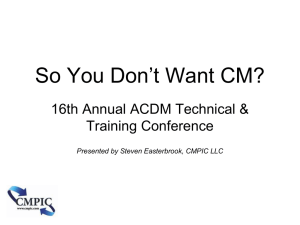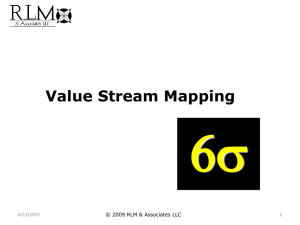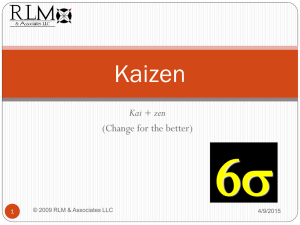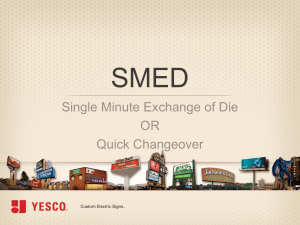Quick ChangeoversSMED
advertisement
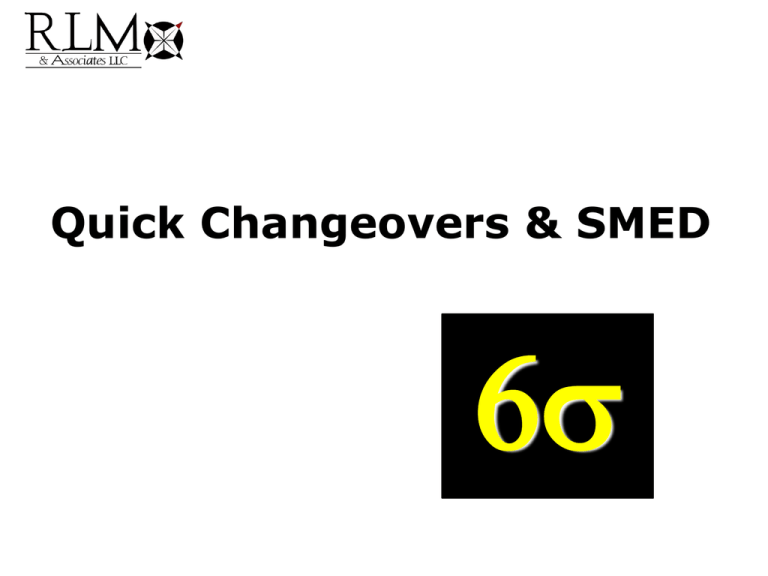
Quick Changeovers & SMED 6 Learning Objectives At the completion of this unit the participant will be able to: 1. 2. 3. 4. 5. What are Quick Changeovers? Why Quick Changeovers? The 8 Steps to Quick Changeovers What is SMED? The 7 Steps to SMED © 2009 RLM & Associates LLC 2 The Race is Won in the Pits © 2009 RLM & Associates LLC 3 © 2009 RLM & Associates LLC 4 What is a Changeover? The amount of time taken to change a piece of equipment from producing the last good piece of a production lot to the first good piece of the next production lot © 2009 RLM & Associates LLC 5 When is the Changeover Complete? 1. Running product A 2. Downtime = Muda or Waste 3. Running product B © 2009 RLM & Associates LLC 6 Why Quick Changeovers? 1. Quick changeovers reduce lead time 2. Increase overall velocity 3. Machines only create value when they are running and not sitting idle © 2009 RLM & Associates LLC 7 Why Quick Changeovers? 1. Reduce lot sizes 2. When lot sizes are reduced, the customer’s lead time is also reduced 3. This is because most of the lead time is waiting (queue time) © 2009 RLM & Associates LLC 8 Quick Changeovers Reduce Inventory Fast changeovers greatly reduce the need for inventory buffers © 2009 RLM & Associates LLC 9 Improves On-Time Delivery Performance Removing the non-value added time results in the customer getting their product sooner © 2009 RLM & Associates LLC 10 8 Techniques to Quick Changeover 1. Separate internal from external setup operations 2. Convert internal to external setup 3. Standardize function, not shape 4. Use functional clamps or eliminate fasteners altogether 5. Use intermediate jigs 6. Adopt parallel operations 7. Eliminate adjustments 8. Mechanization © 2009 RLM & Associates LLC 11 What is SMED? 1. Single Minute Exchange of Dies 2. Developed by Shigeo Shingo 3. A system designed to radically reduce the amount of time to perform a changeover or setup © 2009 RLM & Associates LLC 12 Shingo’s Success 1. “A Revolution in Manufacturing: The SMED System” 2. Toyota, using his techniques, reduced setup time from days to three minutes © 2009 RLM & Associates LLC 13 Focus on the Process, not the Technology 1. SMED should be inexpensive 2. Well planned 3. Well practiced 4. Well executed 5. Without Standard Work, there is no continuous improvement © 2009 RLM & Associates LLC 14 Shingo’s Success Changing dies on stamping machines took up to three days to complete 1. Placed precision measuring devices on the die – used instead of eyeballing 2. Tools designated for SMED were located close by 3. Cut the changeover time to less than 10 minutes! © 2009 RLM & Associates LLC 15 7 Steps to Implementing SMED 1. Observe the current methodology – Watch a full changeover at least once – more is better – Videotape is best © 2009 RLM & Associates LLC 16 7 Steps to Implementing SMED 2. Separate the INTERNAL and EXTERNAL activities. Internal activities are those that can only be performed when the process is stopped, while External activities can be done while the last batch is being produced, or once the next batch has started. For example, go and get the required tools for the job BEFORE the machine stops. © 2009 RLM & Associates LLC 17 7 Steps to Implementing SMED 3. Convert (where possible) Internal activities into External ones (preheating of tools is a good example of this). © 2009 RLM & Associates LLC 18 7 Steps to Implementing SMED 4. Streamline the remaining Internal activities, by simplifying them. Focus on fixings - Shigeo Shingo rightly observed that it's only the last turn of a bolt that tightens it; the rest is just movement. © 2009 RLM & Associates LLC 19 1. Only the final turn on a bolt adds value 2. The interrupted screw (or interrupted thread) provides one means of clamping and unclamping something quickly. Artillery breeches have been sealed in this manner since the nineteenth century. © 2009 RLM & Associates LLC 20 7 Steps to Implementing SMED 5. Streamline the External activities, so that they are of a similar scale to the Internal ones. © 2009 RLM & Associates LLC 21 7 Steps to Implementing SMED 6. Document the new procedure and the actions that are yet to be completed. © 2009 RLM & Associates LLC 22 7 Steps to Implementing SMED 7. Do it all again: For each iteration of the above process, a 45% improvement in set-up times should be expected, so it may take several iterations to cross the ten-minute line. © 2009 RLM & Associates LLC 23 Improvements with Successive Runs © 2009 RLM & Associates LLC 24 Look For… Look for opportunities to eliminate waste in your changeovers, then go after them. In the following video, identify any wasteful activities. © 2009 RLM & Associates LLC 25 © 2009 RLM & Associates LLC 26 Look For 1. Shortages, mistakes, inadequate placement of needed equipment. Can be avoided by using check tables, especially visual ones, and setup on an intermediary jig. 2. Inadequate or incomplete repairs to equipment. 3. Optimization for least work as opposed to least delay. © 2009 RLM & Associates LLC 27 Look For 4. Unheated molds which require several wasted 'tests' before they will be at the temperature to work. 5. Equipment using slow, precise adjustments for the large coarse part of adjustment. 6. Lack of visual lines or benchmarks for part placement on the equipment. © 2009 RLM & Associates LLC 28 Look For 7. Forcing a changeover between different raw materials when a continuous feed, or near equivalent, is possible. 8. Lack of functional standardization, that is standardization of only the parts necessary for setup, e.g. all bolts use same size spanner, die grip points are in the same place on all dies. © 2009 RLM & Associates LLC 29 Look For 9. Much operator movement around the equipment during setup. 10.More attachment points than actually required for the forces to be constrained. 11.Attachment points that take more than one turn to fasten. © 2009 RLM & Associates LLC 30 Look For 12.Any adjustments after initial setup. 13.Any use of experts during setup. 14.Any adjustments of assisting tools such as guides or switches. © 2009 RLM & Associates LLC 31 © 2009 RLM & Associates LLC 32 © 2009 RLM & Associates LLC 33 Parallel Operations Using Multiple Operators Level load the changeover Balance the tasks © 2009 RLM & Associates LLC 34 Teamwork - Parallel Operations Using Multiple Operators © 2009 RLM & Associates LLC 35 SMED Tool Carts © 2009 RLM & Associates LLC 36


